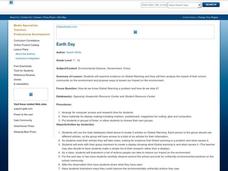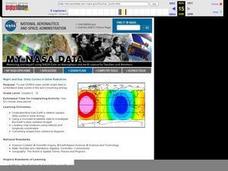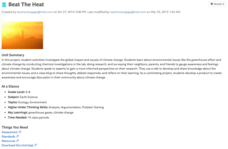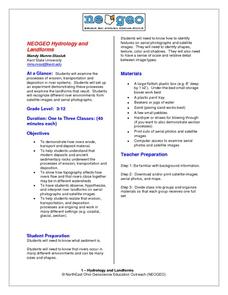Curated OER
Moh's Hardness Test
Young geologists utilize Moh's hardness scale to help them correctly sort and classify different types of rocks. This lesson has everything you need, including an excellent example of the Mohs' Hardness Test, to successfully implement...
Curated OER
Effect of Technology on the Environment
There's no doubt that one of the most consistent dangers to our environment is the risks associated with the extraction and shipment of oil. This lesson focuses on oil spills - how they happen, the effects they have on the environment,...
Curated OER
Earth Day
Students examine evidence on Global Warming and then analyze the impact of their school community on the environment and propose ways to lessen our impact on the environment. They have access to a total of six articles for their...
Curated OER
Natural Phenomena That Change the Earth's Surface
Students explore a natural phenomenon. In this science lesson, students research a natural phenomenon and create a script about that phenomenon. Students act out their scripts for the class.
Curated OER
Earth's Just Peachy!
Students are introduced to the various layers of the Earth. Using fruit, they discover each layer and discover the use of similies in describing it. They watch a video to better describe each layer of the Earth and its purpose.
Curated OER
NIGHT AND DAY: DAILY CYCLES IN SOLAR RADIATION
Students examine how Earth's rotation causes daily cycles in solar energy using a microset of satellite data to investigate the Earth's daily radiation budget and locating map locations using latitude and longitude coordinates.
Columbus City Schools
Planet X
How did the earth become the mass that it is now? Your young scientists explore this question through the concept of density. Their inquiries consider the impact of gravity on the formation of planets. The culminating activity of the...
Core Knowledge Foundation
Rocks & Minerals
Take young geologists on an exploration of the rock cycle with this six-lesson earth science unit on rocks and minerals. Through a series of discussions, demonstrations, and hands-on investigations your class will learn...
Chicago Botanic Garden
Calculating Your Carbon Footprint
Unplugging from technology for one day per week will decrease your carbon footprint—are you up to the challenge? Part two in a series of three allows individuals to explore their personal carbon footprints. By first taking a quiz at home...
Columbus City Schools
Keeping It Hot!
Hot off the presses, this collection of thermal energy activities, lessons, and printables is sure to amaze. Demonstrate how thermal energy moves about in a system using simple materials. Pupils demonstrate their understanding...
Columbus City Schools
Diversity of Living Things
Here's a topic classes can really dig—the fossil record. Use the well-organized and thoughtful road map to take eighth graders back in time to unearth the answer. Learn how our climate has changed, and how organisms have...
Curated OER
Water in the Biosphere
Environmental explorers examine the campus and take note of living organisms. Introduce them to the biosphere and the questions of the day: How much water can be found in the biosphere? A slide show helps you along, and even contains a...
Weber State University
The Sun and the Seasons
Why is there more daylight in June than in December if you live above the equator? How does the angle of sunlight shift throughout the year? Answer these questions and more with an interactive article about the sun, its path through the...
Intel
Biomes in Action
A STEM project-based learning lesson, number four in a series of 10, focuses on human impacts to biomes around the world. Groups work together as environmentalists to research a specific biome, investigating human impacts on it. From...
Chicago Botanic Garden
The Carbon Cycle
There is 30 percent more carbon in the atmosphere today than there was 150 years ago. The first lesson in the four-part series teaches classes about the carbon cycle. Over two to three days, classes make a model of the cycle,...
National Institute of Open Schooling
Occurrence and Extraction of Metals
Steel is a man-made alloy or a mixture of metals. Lesson 18 in this series of 36 focuses on metals and their extraction from Earth. Individuals read about, discuss, and answer questions after learning how people find most metals, the...
Kenan Fellows
Farm to Fuel: The Alternative Fuels Industry
Need a lesson to fuel young minds? A variety of hands-on activities is sure to get your class fired up! Beginning with an introductory slideshow and culminating with group presentations, the week-long unit has something for everyone....
Curated OER
Understanding Climate Change
The young scientists in your class will appreciate a resource about different elements of climate change. The packet includes factual materials, informational text, and clear visuals, perfect for sharing with your environmental...
It's About Time
The Sun and Its Effects on Your Community
Why is the sun round? Examine this question, and others, with your pupils while teaching them how to live in a more earth-friendly environment. Pupils explore Sun composition and discuss how solar wind, sunspots, and solar energy affects...
Intel
Beat the Heat
Explore greenhouse effect and climate change through a 15-day unit. Scholars learn about these STEM concepts by researching, conducting surveys, experimenting, and collaborating with experts in the field. They frequently communicate...
Wilderness Classroom
Pollution
Educate scholars on pollution—air, water, and land—with a series of lessons that begin with a thorough explanation of each type. Learners then take part in three activities to reinforce the importance of reducing pollution. They...
NorthEast Ohio Geoscience Education Outreach
Hydrology and Landforms
Three days of erosion exploration await your elementary geologists. Learners begin by examining rivers via Google Earth, then they model water flow in sand, and finally, they identify resulting landforms. This lesson is written...
San Francisco Public Utilities Commission
Recycled Water: A Smart Way to Reuse Water
Learn about wastewater and recycled water with a science reading activity. After learners finish a two-page passage about conserving the water supply, they answer six comprehension questions about what they have read.
Curated OER
Lesson 5: Technology: Conveniences and Consequences
Young scholars identify positive and negative impacts of technology. In this technological advancements lesson, students consider how toxic pollution affects the Earth and its inhabitants. Young scholars participate in 3 activities that...

























